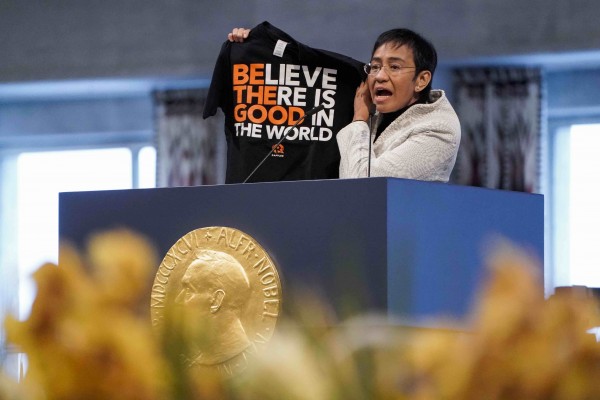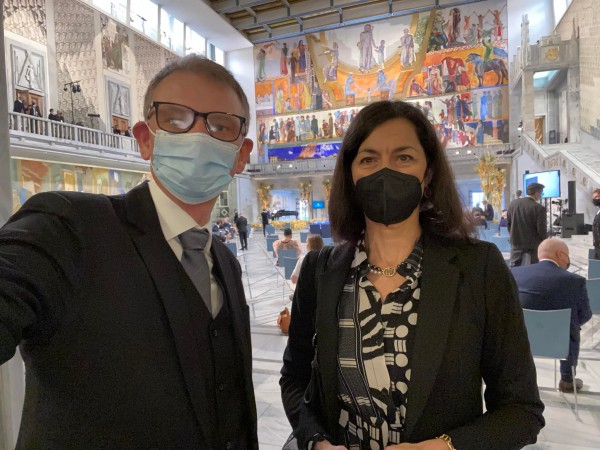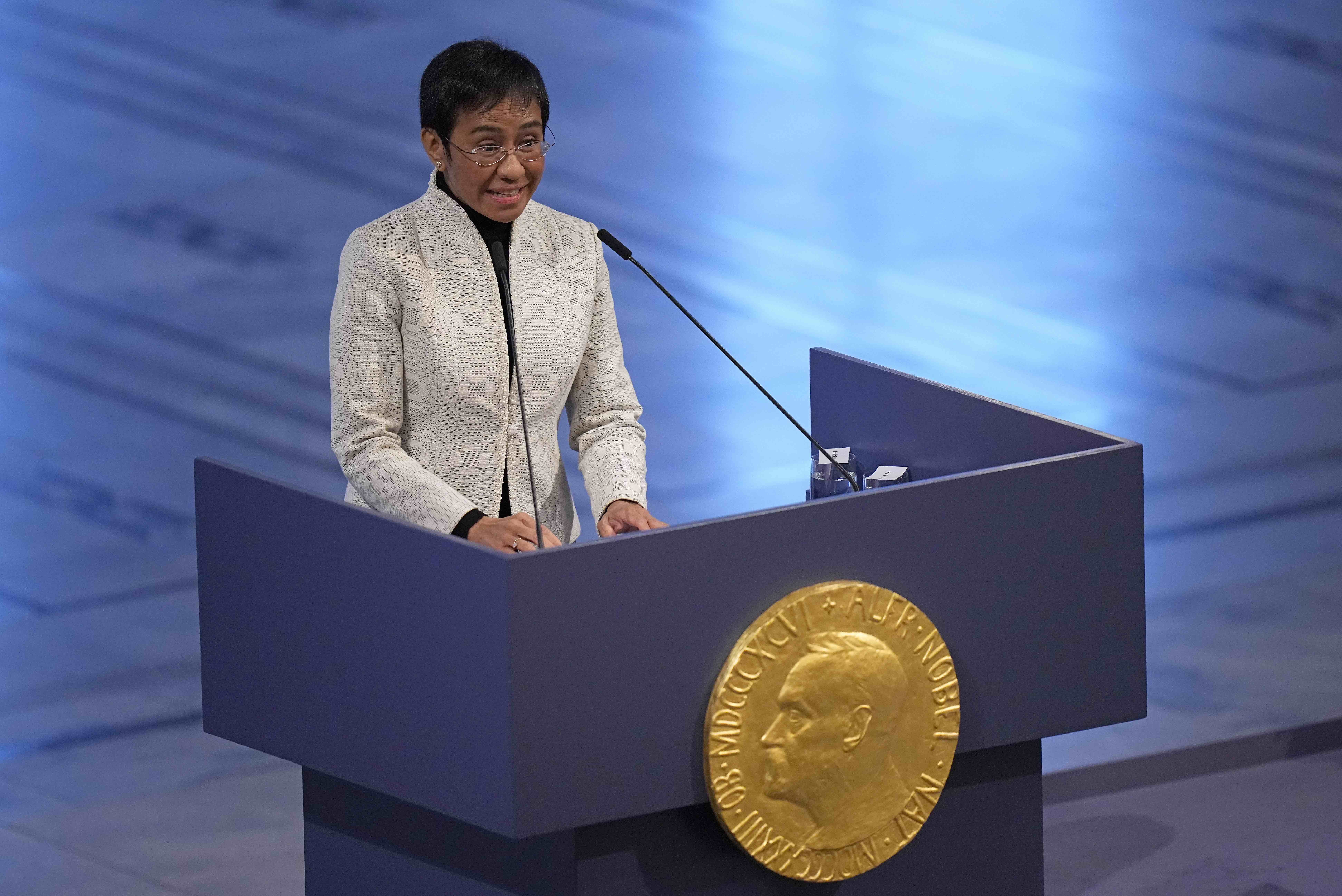On December 10, 2021, this year’s Nobel Peace Prize was awarded to two outstanding journalists and fighters for press freedom: Maria Ressa, an IPI Executive Board member and CEO of the independent Philippine news outlet Rappler; and Dmitry Muratov, co-founder of Russian independent newspaper Novaya Gazeta. Today’s ceremony highlighted the importance of independent media for democracy and stood as a call for better protection of journalists worldwide.
Today, IPI celebrates our friends and colleagues Maria Ressa and Dmitry Muratov and this incredible moment – a Nobel for press freedom. IPI Executive Director Barbara Trionfi attended the ceremony in Oslo on behalf of the IPI global network.
“I stand before you, a representative of every journalist around the world who is forced to sacrifice so much to hold the line,… to bring you truth and hold power to account”, Ressa said at the start of her Nobel Lecture in Oslo’s City Hall, in front of 200 people in person and thousands more online. Just before her speech, trumpets had celebrated this year’s two Nobel Peace Prize laureates, Ressa and Muratov, who are the first working journalists to receive the prize since 1935.
The laureates received the prize as “participants in a war where the written word is their weapon, where truth is their goal and every exposure of misuse of power is a victory”, Berit-Reiss Andersen, chair of the Norwegian Nobel Committee said. “The role of the press is to reveal aggression and abuse of power, thereby contributing to peace. This work is carried out unremittingly by journalists every day all over the world. The Nobel Peace Prize for 2021 has been awarded to two outstanding representatives of the press.”
Pillar of democracy
At first, it was unclear if Ressa could even attend the ceremony, as the Philippine government had sought to prevent the IPI Executive Board member from travelling to Norway to accept her Nobel Peace Prize in person. But following a global outcry, including from IPI’s Executive Board, an appeals court allowed Ressa to fly to Oslo, where she held up freedom of speech as a pillar of democracy and explained why independent journalism is worth fighting for.

In her address, Ressa called attention to the continued attacks on journalists worldwide. Among other incidents, she recalled the brutal dismemberment of Jamal Khashoggi, the assassination of Daphne Caruana Galizia in Malta, and the abduction of Roman Protasevich in Belarus. “And in my own country, 23-year-old Frenchie Mae Cumpio, still in prison after nearly 2 years, and just 36 hours ago I received the news that my former colleague, Jess Malabanan, was shot dead.”
Ressa, too, has experienced death threats for her work, and has faced 10 arrest warrants in the Philippines in less than two years. “All told, the charges I face could send me to jail for about a 100 years”, she told the audience. But she said the challenges and legal harassment had only heightened her resolve. “The more I was attacked for my journalism, the more resolute I became. I had first-hand evidence of abuse of power. What was meant to intimidate me and Rappler only strengthened us.”
Ressa also took social media and internet companies to task for spreading hate over truth, and accelerating attacks on journalists. Tech companies and their algorithms have “a god-like power to pit us against each other, bring out fears, anger and hate, and set the stage for the rise of authoritarians and dictators around the world”, she said.
Our greatest need today, Ressa said, was to transform “that hate and violence”. “In order to be good, we have to believe there is good in the world. The destruction has happened. Now it’s time to build – to create the world we want”, she said before asking the audience to close their eyes. “Now let’s go and make it happen. Let’s hold the line. Together.”
‘Dark valley’
Dmitry Muratov, co-founder and editor-in-chief of leading Russian independent newspaper Novaya Gazeta, was awarded the prize as “one of the most prominent defenders of freedom of speech in Russia today”, the Nobel Committee said.
Novaya Gazeta is one of the few independent media outlets in Russia today, a country that is “going through a dark valley”, Muratov said in his acceptance speech. “Over a hundred journalists, media outlets, human rights defenders and NGOs have recently been branded as ‘foreign agents’. In Russia, this means ‘enemies of the people’. Many of our colleagues have lost their jobs. Some have to leave the country.”
But the decline of freedom of speech is not just a Russian matter, Muratov warned, as the world “has fallen out of love for democracy”. “The world has become disappointed with the power elite. The world has begun to turn to dictatorship.”
Still Muratov emphasized that there was hope. Independent journalism, he said, can turn this development around by following a clear mission – to distinguish between facts and fiction. “As governments continually improve the past, journalists try to improve the future.” In fact, states cannot make progress without critical and independent watchdogs, Muratov said. “Yes, we [the journalists] growl and bite. Yes, we have sharp teeth and strong grip. But we are the prerequisite for progress. We are the antidote against tyranny.”
Muratov dedicated the award to his colleagues from Novaya Gazeta who have lost their lives – Igor Domnikov, Yuri Shchekotschikhin, Anna Politkovskaya, Anastasija Baburova, Stas Markelov and Natasha Estemirova – but also to those still alive , “to the professional community who perform their professional duty.”
IPI in Oslo

Together with IPI Norway National Committee Chair Ole Kristian Bjellaanes, IPI Executive Director Barbara Trionfi attended the Nobel Peace Prize ceremony on behalf of the IPI global network. In the evening, she addressed a special torchlight procession in Oslo to honour Ressa and Muratov.
